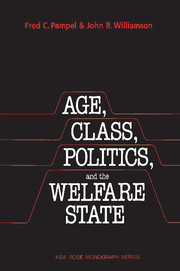Book contents
- Frontmatter
- Contents
- List of tables
- Preface
- 1 The welfare state: some neglected considerations
- 2 Theoretical perspectives on the welfare state
- 3 Social welfare spending in advanced industrial democracies
- 4 Social welfare spending and democratic political context
- 5 Economic growth, social welfare spending, and income inequality
- 6 Infant mortality, equality, and social welfare spending
- 7 Conclusions: The causes and consequences of the welfare state
- References
- Index
- Other books in the series
2 - Theoretical perspectives on the welfare state
Published online by Cambridge University Press: 30 April 2010
- Frontmatter
- Contents
- List of tables
- Preface
- 1 The welfare state: some neglected considerations
- 2 Theoretical perspectives on the welfare state
- 3 Social welfare spending in advanced industrial democracies
- 4 Social welfare spending and democratic political context
- 5 Economic growth, social welfare spending, and income inequality
- 6 Infant mortality, equality, and social welfare spending
- 7 Conclusions: The causes and consequences of the welfare state
- References
- Index
- Other books in the series
Summary
The remarkable growth of explanations and studies of the welfare state has brought about some theoretical disorganization. Scholars often fail to distinguish adequately among the various explanations, use broad terms such as pluralist or neo-Marxist to cover quite different arguments, and gloss over the fact that different theories contain similar arguments. It is well worth the effort to systematize the different theories of the welfare state into a parsimonious yet meaningful scheme that can guide the specification and testing of the hypotheses to follow in the empirical chapters. We begin this effort by making a distinction between demand-based theories, which attend to the externally generated demands of groups and classes for spending, and state-based or supply theories, which consider the characteristics of states that autonomously determine the supply of spending. Concentrating initially on the demand theories, we review the three questions raised at the outset of the book but attach more distinct theoretical labels to the answers and systematically present the theories. We then turn to the state-based theories, laying out their basic arguments and predictions and contrasting them with those of the demand theories.
Demand theories
To review, theories of the welfare state address each of the three questions we discussed in the first chapter. First, does welfare spending respond primarily to class structure and class interests or to economic development and the size of ascriptive groups such as the aged?
- Type
- Chapter
- Information
- Age, Class, Politics, and the Welfare State , pp. 22 - 49Publisher: Cambridge University PressPrint publication year: 1989



